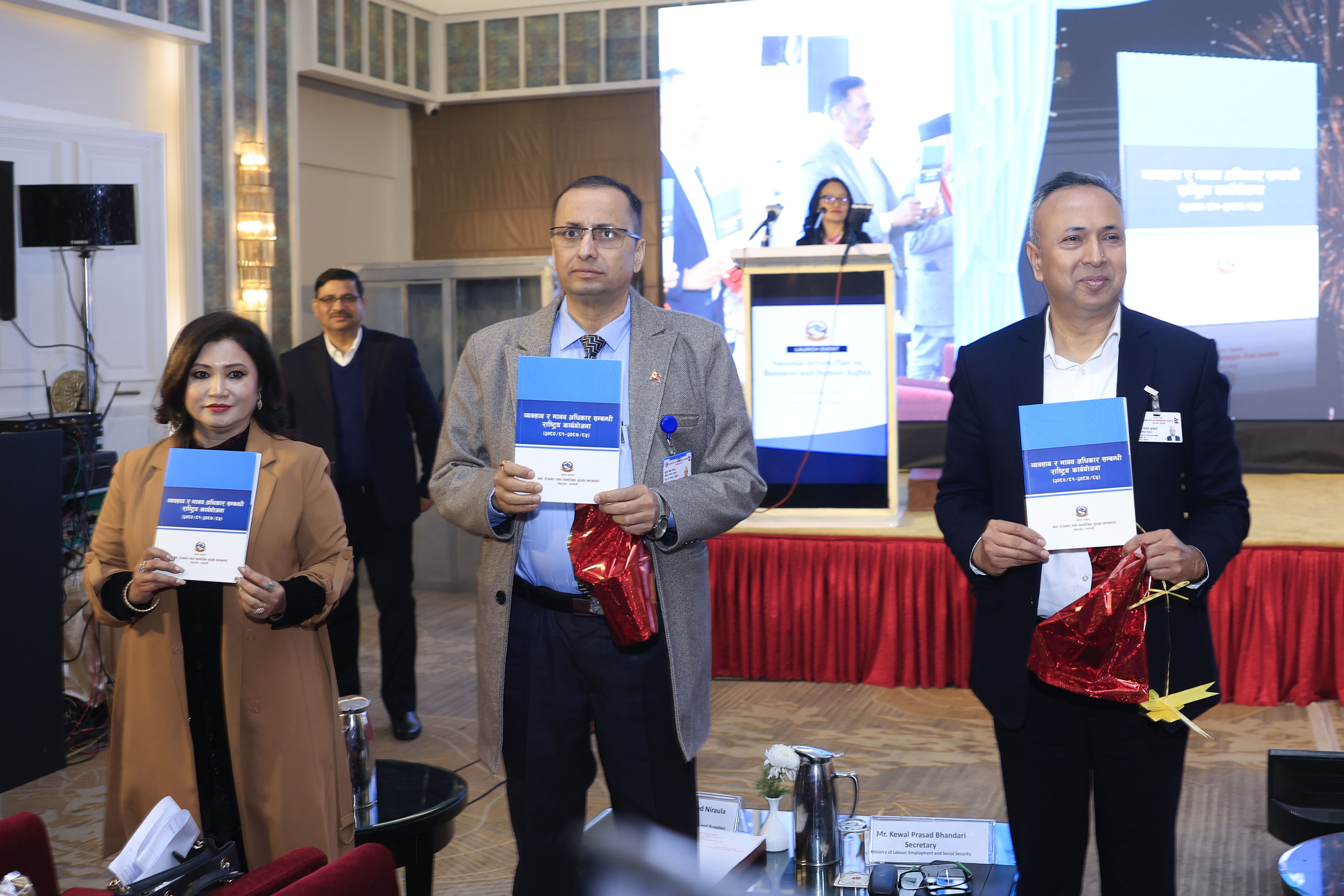Nepal adopted the United Nations Guiding Principles on Business and Human Rights earlier this year with the launch of its National Action Plan on Business and Human Rights. This plan was launched by the Government of Nepal, Ministry of Labor, Employment and Social Security (MoLESS) in collaboration with UNDP and supported by the governments of Japan and Norway.
This is Nepal's most substantial implementation on a national scale since the United Nation Guiding Principles (UNGP) on Business and Human Rights were formally endorsed by the UN Human Rights Council in 2011. This ambitious yet achievable five-year plan (2024-2028) aims to integrate human rights into Nepal’s economic development strategy, aligning with the UNGP’s 31 principles on governmental and corporate responsibilities to prevent and address business-related human rights abuses. Looking forward, it is essential for Nepali businesses to implement human rights standards with active collaboration between the government and civil society.
Despite this initiative, Nepal still faces challenges in distinguishing Corporate Social Responsibility (CSR) from Business and Human Rights, a gap that has yet to be formally addressed as most still believe that BHR and reporting are voluntary for corporate companies and they are pushed to the CSR corner. It is crucial for Nepali businesses to recognize that Business and Human Rights (B+HR) are not voluntary, but rather an international obligation that requires formal national adoption. Following the launch of the National Action Plan (NAP), B+HR is not just a recommendation but an increased obligation for businesses to respect and promote, with the state acting as the primary enforcer.
Nepali stakeholders, including CSOs, business groups, academics, and media, call for a participatory, transparent, and accountable National Action Plan on Business and Human Rights. Their key demands include:
- Inclusive process: Engage diverse groups, including affected communities, and follow the UN's 15-step model developed by the UN Working Group (UNWG) on Business and Human Rights.
- Transparency and accessibility: Ensure draft publications, feedback opportunities, and accessible redress mechanisms.
- Alignment with international standards: Amend laws to align with human rights standards, prioritizing labor, indigenous, and gender rights.
- Integration with global frameworks: Harmonize with United Nations SDGs, the Paris Agreement, and other key global initiatives.
- Effective monitoring: Establish an implementation plan with regular reviews, led by the Ministry of Labor, Employment and Social Security (MoLESS), involving stakeholders in oversight.
Nepal, however, looks like it will have similar challenges to Japan's when it launched its NAP in 2020 and issued guidelines on human rights in supply chains in 2022; these measures remain non-binding. For instance, Japanese companies competing for government contracts are encouraged, but not mandated, to follow human rights guidelines, and there are no binding laws requiring detailed human rights disclosures, despite revisions to Japan’s Corporate Governance Code in 2021 to include human rights considerations. This cautious approach to mandatory regulations reflects Japan’s preference for voluntary compliance over strict legal requirements, a sentiment that is also shared in Nepal. This soft-law approach in Nepal will likely encourage corporates and businesses to follow HR disclosures but due to its non-binding status, it will likely not be upheld on a national or even provincial level.
Recent international developments
On October 16, the UK House of Lords Select Committee published a report following the review of the Modern Slavery Act 2015, recommending stronger measures to improve business practices in combating modern slavery. Global pressure, especially from international investors and regulatory shifts, is pushing Japan toward stricter human rights standards, including mandatory Human Rights Due Diligence (mHRDD).
Earlier this year, the EU adopted the Corporate Sustainability Due Diligence Directive (CSDDD), requiring large companies to address human rights and environmental impacts across their operations and supply chains. The directive, effective by 2027, mandates due diligence policies, risk assessments, and climate transition plans. Non-compliance could lead to penalties of up to 5 percent of global turnover and potential civil liability. This move is likely to inspire similar mHRDD laws in other countries.
Way forward for Nepal
Nepal’s initiation of its National Action Plan on Business and Human Rights is a crucial progress in this area. While learning from global examples like mHRDD legislation, Nepal should address its unique challenges and avoid simply following Western-centric models.
Learning from its closest neighbor India’s BRSR Framework: India’s recent Business Responsibility and Sustainability Reporting Framework, launched in 2023, mandates the top 1,000 listed companies to report on 140 sustainability metrics, aligning with key global standards like Global Reporting Initiative (GRI) and Task Force on Climate-related Financial Disclosures (TCFD). It covers nine core areas: environmental protection, human rights, integrity, employee well-being, inclusive growth, sustainable products, responsible consumer engagement, stakeholder responsiveness, and public policy engagement. This approach ensures transparency and accountability. Nepal can start such mandatory regulation with limited companies in various sectors including manufacturing, energy, government, healthcare and infrastructure with highest annual revenue on sustainability metrics that align with GRI and TCFD with similar nine core areas as that of India.
Key lessons for Nepal
- Mandatory Reporting: Nepal could benefit from a mandatory ESG and Human Rights reporting framework for large companies, ensuring accountability and aligning with global standards.
- Clear Indicators: Nepal can develop local indicators, inspired by BRSR focusing on human rights, environmental protection, and inclusive growth. For the long term, mHRDD is easier to transition through this initial regulatory mechanism.
- Transparency and Comparability: Mandatory reporting would build trust and attract investment, especially when the government is pushing towards Foreign Direct Investment for economic growth. The Investment Board of Nepal and National Planning Commission can directly assist the council of ministers to ensure supportive environments through effective planning for ESG investment and responsible business practices.
- Global Alignment: Aligning with international frameworks would enhance Nepali companies’ competitiveness globally.
Adopting a similar framework would help Nepal promote sustainable growth and responsible business practices, positioning it as a proactive player in the rise of the global south.
(The author is a Bachelor of Laws (Honors) at Macquarie Law School, Sydney)

